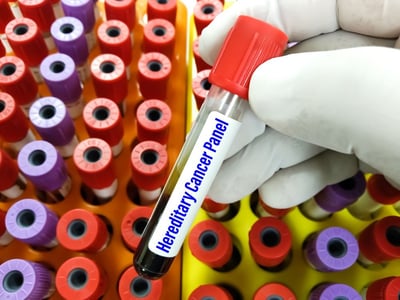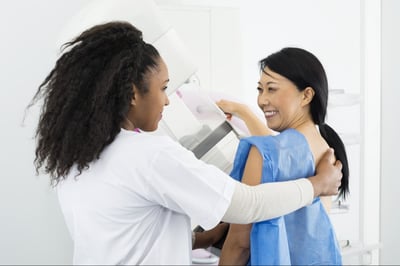Detrás de los titulares sobre el cáncer
Obtener más información sobre el programa de XRAY



Relevancia: Media
Este artículo es de mayor interés para: Mujeres transgénero con mutaciones hereditarias que están considerando recibir o que ya recibieron tratamientos de afirmación de género.
Artículo: Riesgo de cáncer de mama en mujeres transgénero con mutaciones hereditarias
Se han realizado pocas investigaciones sobre el riesgo de cáncer de mama en mujeres transgénero con alto riesgo de padecer este tipo de cáncer por una mutación hereditaria. En esta publicación se presenta un resumen de la información conocida respecto a este tema. (Publicado el 29/11/23)
Leer más ›



Relevancia: Alta
Este artículo es de mayor interés para: Personas interesadas en las pruebas genéticas
Artículo: Las pruebas genéticas y el futuro de la medicina
Un artículo publicado en Katie Couric Media habla sobre el tema de las pruebas genéticas y el impacto que tienen en la salud. La autora del artículo conversó con el Dr. Robert Steiner, un médico especializado en genética. El Dr. Steiner habló sobre las pruebas genéticas y cómo los resultados pueden afectar la salud y cambiar la vida de las personas. (Publicado el 28/9/23)
Leer más ›


Relevancia: Media-alta
Este artículo es de mayor interés para: Personas con cáncer de próstata metastásico resistente a la castración con una mutación en el gen BRCA1 o BRCA2
Actualización: Nueva combinación de medicamentos como tratamiento inicial contra el cáncer de próstata metastásico
La FDA aprobó Lynparza (olaparib) para usarse como tratamiento para una etapa más temprana contra el cáncer de próstata metastásico resistente a la castración (CPRCm) al combinarse con abiraterona y prednisona para personas con una mutación en el gen BRCA detectada por medio de una prueba genética o tumoral. Ahora se puede combinar Lynparza con terapia hormonal como tratamiento de primera línea o posterior. (Publicado el 11/9/23)
Leer más ›


Relevancia: Media-baja
Este artículo es de mayor interés para: Personas con tumores sólidos.
Artículo: Dan inicio estudios clínicos con prometedor medicamento para tratar el cáncer
El equipo de investigación de City of Hope está sometiendo a prueba un nuevo tipo de medicamento para tratar el cáncer. En las primeras pruebas en animales y en células extraídas de cánceres de seres humanos, este nuevo medicamento impidió el crecimiento de muchos tipos de cáncer. Apenas se iniciaron los primeros estudios clínicos con personas. (Publicado el 9/7/23)
Leer más ›


Relevancia: Media-alta
Este artículo es de mayor interés para: Adultos jóvenes
Tema: Aumento de casos de cáncer colorrectal en adultos jóvenes: lo que los jóvenes millennials y de la generación Z deben saber
En Estados Unidos, desde la década de los noventa se ha observado un aumento de casos de cáncer colorrectal en adultos jóvenes. Los científicos están tratando de descubrir las razones de este aumento de casos. (Publicado el 15/8/23)
Leer más ›


Relevancia: Media-alta
Este artículo es de mayor interés para: Personas que no tienen un alto riesgo de cáncer de ovario y que piensan someterse a cirugía del área pélvica.
Tema: Disminuir el riesgo de cáncer de ovario sin tener que extirpar los ovarios
La principal organización que estudia el cáncer de ovario recomienda que todas las mujeres que se sometan a cirugías del área pélvica también consideren extirparse las trompas de Falopio para disminuir el riesgo de cáncer de ovario. (Publicado el 18/7/23)
Leer más ›


Relevancia: Media-alta
Este artículo es de mayor interés para: Personas que se realizaron una mamografía.
Directrices: ¿Qué es la densidad mamaria y cuál es su importancia?
Las nuevas directrices de la FDA se deben implementar a más tardar en septiembre de 2024. La actual directriz de la FDA exige que los hospitales y las clínicas de mama se enfoquen en proporcionar información a las personas sobre la densidad de sus mamas en los resultados del mamograma. Para septiembre de 2024, los proveedores de mamogramas deben informar a las pacientes con mamas densas que deben consultar con su médico la necesidad de realizarse pruebas adicionales de diagnóstico por imágenes. Este artículo proporciona información general sobre la densidad de las mamas y explica por qué el tema es importante. (Publicado el 8/6/23)
Leer más ›


Relevancia: Media
Este artículo es de mayor interés para: Personas con cáncer que están embarazadas.
Tema: Repercusiones de las nuevas leyes sobre el tratamiento contra el cáncer durante el embarazo
La Corte Suprema de EE. UU. dictaminó en 2022 que el aborto ya no es un derecho protegido por la Constitución. Esta decisión histórica deja la regulación del aborto en manos de los estados. El tratamiento contra el cáncer durante el embarazo puede verse afectado en los estados que prohíben o limitan el aborto. (Publicado el 31/5/23)
Leer más ›


Relevancia: Alta
Este artículo es de mayor interés para: Personas con una mutación en el gen CDH1 o con antecedentes familiares de cáncer de estómago.
Artículo: La decisión de una amante de la comida de extirparse el estómago pone en el reflector las difíciles decisiones en torno al riesgo de padecer cáncer
Sáša Woodruff, reportera del National Public Radio (servicio de radiodifusión pública de Estados Unidos), comparte su historia de cómo se enteró de que tiene una mutación en el gen CDH1 y el proceso para decidir sobre la cirugía preventiva. Las mutaciones en el gen CDH1 aumentan de forma importante el riesgo de una persona de padecer cáncer de estómago y cáncer de mama. En su ensayo personal Woodruff describe el reto psicológico que representó para ella el proceso de decidir sobre las cirugías preventivas y centra la atención en una mutación poco conocida relacionada con el cáncer hereditario. (Publicado el 17/5/23)
Leer más ›


Relevancia: Media
Este artículo es de mayor interés para: Personas con una mutación hereditaria en los genes BRCA1 o BRCA2 que sienten preocupación por su riesgo de padecer cáncer de mama
Estudio: El peso puede afectar el riesgo de padecer cáncer de mama en las mujeres con una mutación hereditaria en el gen BRCA
En un estudio que analizó las células mamarias normales de mujeres con una mutación hereditaria en el gen BRCA se observó un mayor daño en el ADN en las mujeres con sobrepeso (con base en la medición conocida como índice de masa corporal) que en las mujeres sin sobrepeso. Los resultados indican que no tener exceso de peso puede disminuir la presencia de cáncer de mama en la población con alto riesgo de padecer la enfermedad. (Publicado el 30/3/23)
Leer más ›